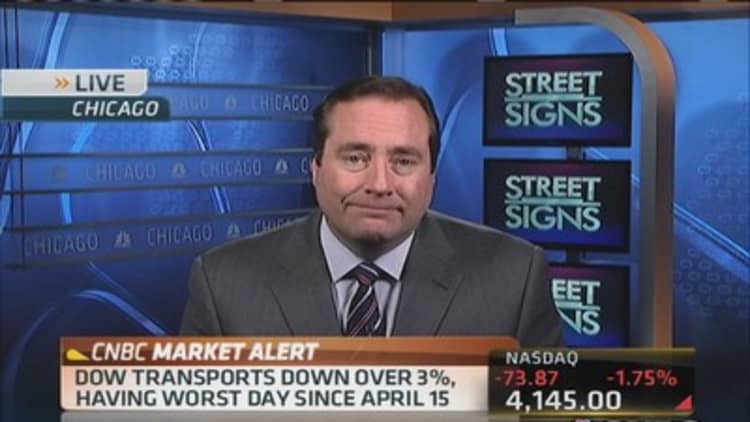Congestion in cities around the world, especially in countries like China, Brazil and Russia, will mean a drop in the number of vehicles being driven globally, according to a new study by IHS Automotive and Groupe Futuribles.
But even more troubling for the auto industry is the study's projection that annual auto sales will be trimmed by 30 million vehicles annually by 2035.
(Read more: Fewer city dwellers own cars)
"Tomorrow's cities just cannot fit the same number of cars per person as do the mature-market cities of today," said Phillip Gott, IHS Automotive managing director.
The numbers could spell trouble for automakers, who are banking on growing sales in developing markets over the next 20 years to drive profits. General Motors, for example, already sells more vehicles in China than in the U.S., and its executives have made it clear the country will be a primary profit driver in future years.
China's crowded streets
While the new study points out many cities in the world are wrestling with congestion, China is of particular concern. As sales have exploded there, some cities are already approaching the limit for vehicle registrations set by the Chinese government.
In Beijing, the government has set an absolute cap for vehicle registrations at 6 million for the city. Already, 5.4 million are registered.
So what's the problem?
(Read more: Money worries keep Gen Y from buying, leasing cars)
The ratio of vehicles registered per thousand people in Beijing is well below that seen in the U.S. or in European cities, meaning there are thousands in Beijing who may want to buy a new car but will be unable to do so.

Currently there are 130 cars per 1,000 people in Beijing's urban zone, while U.S. and European cities have ratios of 400 to 500 per 1,000 residents.
This year, auto sales in China are expected to top 21 million vehicles, according to IHS Automotive. By comparison, U.S. auto sales are projected to be 16.4 million.
Worldwide, the auto industry is expected to build a record 87.4 million vehicles.
Boon to car sharing?
As congestion and pollution continue to choke some of the world's largest cities, there's a growing sense residents in those cities will turn to car-share programs to get around.
Zipcar has seen increased business in many U.S. cities due to residents deciding they cannot afford, or perhaps don't have the space, to own a car.
(Read more: European car sales decline for sixth-straight year)
It's a trend that industry leaders are aware of, with some saying these types of businesses will likely become more popular.
Bill Ford, chairman of Ford Motor and the great-grandson of Henry Ford, has been warning business and government leaders that the world is quickly driving toward a massive traffic jam.
"If we do nothing, we face the prospect of 'global gridlock', a never-ending traffic jam that wastes time, energy and resources and even compromises the flow of commerce and health care," Ford said last year at the Mobile World Congress in Spain.
—By CNBC's Phil LeBeau. Follow him on Twitter @LeBeauCarNews.
Questions? Comments? BehindTheWheel@cnbc.com.


